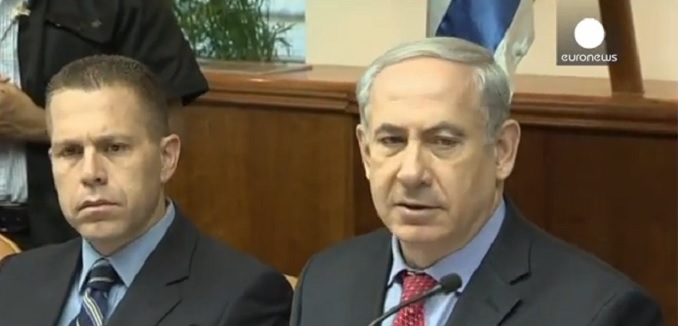A meeting of top Israeli political leaders on Thursday, called in order to chart Jerusalem’s response to a Wednesday announcement by Palestinian leaders that the rival Fatah and Hamas factions had agreed to a deal that would see the formation of a unity government with members from both groups, concluded with a decision to suspend peace talks until the composition of that government was solidified:
“Abu Mazen [Palestinian Authority President Mahmoud Abbas] needs to choose between peace with Israel and an accord with Hamas,” Prime Minister Binyamin Netanyahu said on Wednesday.
“Abu Mazen chose Hamas, and not peace. Anyone who chooses Hamas does not want peace.”
The Israeli move was not unexpected. Top figures from Hamas had already declared that the unity government would not see the group accepting the Palestinian Authority’s obligations toward Israel, including the recognition of its right to exist and a renunciation of violence. State Department Spokeswoman Jen Psaki on Wednesday emphasized to reporters no fewer than four times that Israel could not “be expected to negotiate with a government that does not believe in its right to exist,” and the Israelis for their part had declared that the Palestinian Authority (PA) would have to choose between ongoing peace talks and an embrace of Hamas.
Al Monitor assessed Wednesday that the agreement had been “the last straw for Congress” regarding perceptions of PA President Mahmoud Abbas in general, and more specifically regarding the degree to which the United States should continue extending assistance to an Abbas-led PA.
The piece quoted Rep. Ileana Ros-Lehtinen (R-FL) – who had authored the Palestinian Anti-Terrorism Act, which conditioned aid to any Palestinian government on the absence of terrorists in leadership positions:
“The Administration must halt aid to the Palestinian Authority and condition any future assistance as leverage to force Abu Mazen [Mahmoud Abbas] to abandon this reconciliation with Hamas and to implement real reforms within the PA,” Ros-Lehtinen, who chairs the House Foreign Affairs panel on the Middle East, said in a statement. “U.S. law is clear on the prohibition of U.S. assistance to a unity Palestinian government that includes Hamas, a designated Foreign Terrorist Organization, and President [Barack] Obama must not allow one cent of American taxpayer money to help fund this terrorist group.”
Her Democratic counterpart on the subcommittee, Ted Deutch of Florida, issued a similar warning.
“President Abbas now stands at a pivotal crossroad — does he want peace with Israel or reconciliation with Hamas?” Deutch said. “Be certain that the Palestinian Authority will face significant consequences if a unity government is formed that includes terrorist members of Hamas.”
Rep. Nita Lowey (D-NY), the ranking Democrat on the House Appropriations Committee, tersely stated that Abbas’s reconciliation move “jeopardizes US assistance.”
Al Monitor also conveyed details of a conference call held Wednesday by The Israel Project (TIP) in which Hillel Frisch, a senior research fellow at the Begin-Sadat Center for Strategic Studies at Bar-Ilan University, had explained to reporters that a Palestinian unity government was in fact a vital prerequisite to the creation of a viable Palestinian state, but that it could not come at the expense of the Palestinians meeting their past obligations to recognize Israel and renounce violence. The alternative would be tantamount to Palestinian negotiators having spent decades extracting functionally irreversible concessions from Israel at the negotiating table, before pocketing those concessions and then abrogating the commitments.
[Photo: Euronews (in English) / YouTube]




